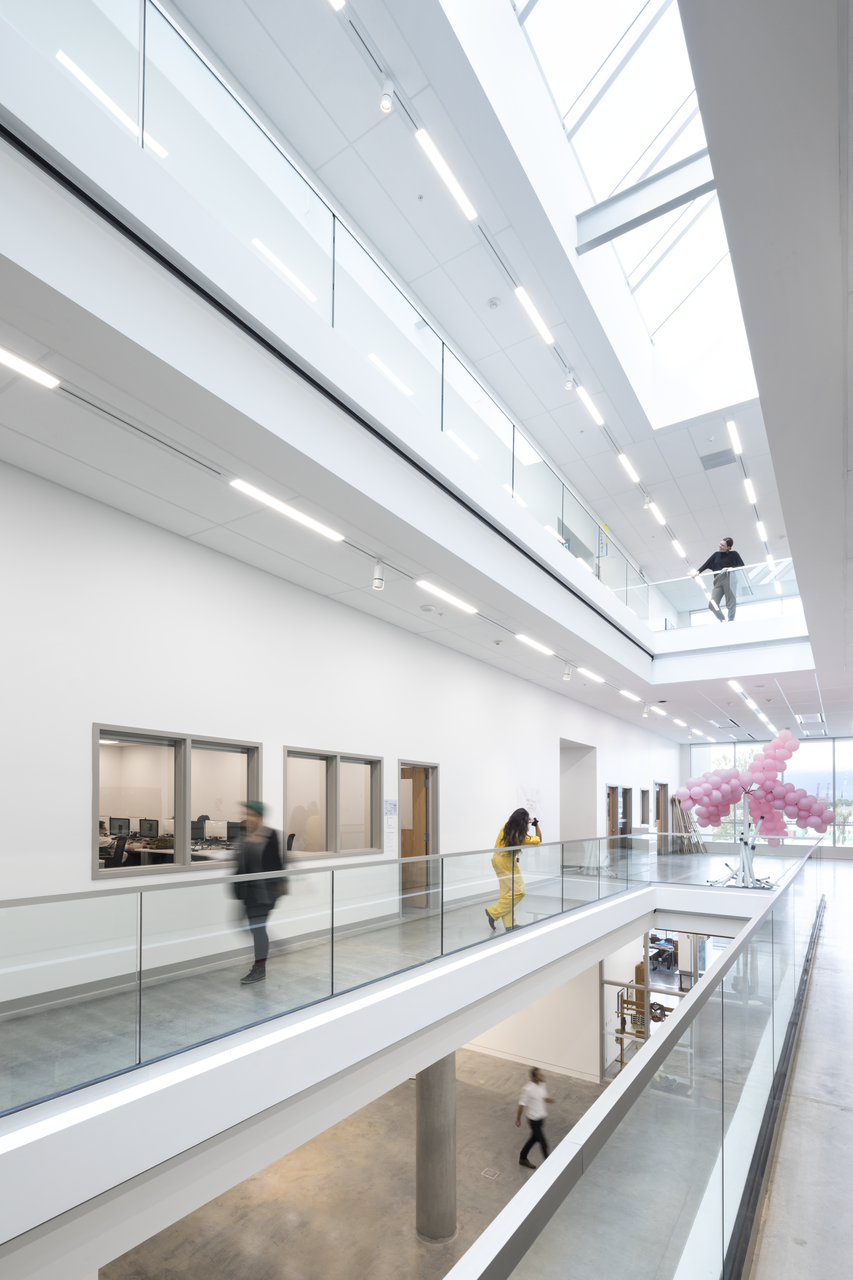Welcome to the Emily Carr Foundation Fall 2024 Semester!
We will continue to add information that will be helpful to all faculty who are teaching FNDT165 in the Fall 2024 semester. Please check regularly for any additions.
If there is any information or resources you would like to add or have included on this site, please contact Janet at jwang11956@ecuad.ca.
Foundation contacts + resources:
Technicians: Meghan Weeks, Michael Norris & Jeremy Pavka foundationtechs@ecuad.ca
Foundation Program Advisor: Gaye Fowler gfowler@ecuad.ca
Foundation Program Assistant: Alex Fowler afowler@ecuad.ca
Foundation Program Assistant: Willow Silvestrone wsilvestrone@ecuad.ca
_________________________________________________________________
Foundation shop moodle: https://courses.ecuad.ca/course/view.php?id=6563
Foundation instagram: @ecufoundation
_________________________________________________________________
GENERAL RESOURCES:
Academic Affairs area: contact information, links to forms, Course online manager, etc.
Guest Artist booking Fall 2024
- Teacher: Janet Wang

The 2024 Grad Studies X Research Ethics Intensive is a pilot program for First Year Master’s students aimed to prepare them for research and creative projects involving people as participants. This series of workshops and studios brings a wide array of university resources in one place, to prepare students for writing research ethics applications, planning partnerships with communities, writing consent materials and data management plans, planning ethical Indigenous research, and more. The series includes hybrid presentations, workshops, studios, recordings, and other materials on an online course site.
Students who are planning summer 2024 research projects, engaging people as participants, are strongly encouraged to attend. The February sessions will provide an overview of research ethics considerations and the April studio sessions will enable you to complete and submit research ethics applications in time for summer approval.
- Teacher: Nadia Beyzaei
- Teacher: Cait Eakins
- Teacher: Professor Alla Gadassik
- Teacher: Lee Gilad
- Teacher: Katherine Gillieson
- Teacher: Jon Hannan
- Teacher: Lois Klassen
- Teacher: Kajola Morewood
- Teacher: Sara Osenton
- Teacher: Leanne Rooney
- Teacher: Hillary Webb
- Teacher: Muxiang Yu
FNDT 165: Course Description
- Foundation Core is an introduction to a breadth of conceptual, technical and disciplinary approaches that includes 2D, 3D and 4D disciplines. Exploring different forms of conceptual and material-based inquiry, this studio course focuses on the understanding and articulation of core values shared across contemporary art, design, and media disciplines. Foundation Core emphasizes practices and concepts that provide a solid platform for any of the degree-focused studio cores offered in the second semester.
Foundational Values and Principles
Foundation Core is a required studio class common to all Foundation students in the first semester of studies at Emily Carr University. By providing a common and shared experience, this course functions as an important introduction to the school community and to approaches and values shared across curriculum and program areas.
Underscoring discussion of needed resources, structural and institutional changes, and innovative pedagogy is a sense of these principles or key values:
Critical Core Practices (Making, Thinking, Writing)
Ecological, Social, and Institutional Sustainability
Cross-Faculty Exchange and Dialogue
Contextual Awareness and Engagement
Working with and in Public(s)
Holistic Educational Experiences
Foundation Core models a holistic teaching and learning approach that emphasizes connections among thinking / making / writing, and emphasizes links among creative and critical practices. It combines the development of technical and creative skills with articulation that serve across a breadth of all the majors offered at the university.
This course introduces students to the expectations and demands of university level studies and the importance of developing a strong and independent work ethic and sense of agency, while allowing students to develop combined visual, verbal, and intercultural literacies, as well as ethical practices in research and production. These shared literacies provide a strong basis for the disciplinary focus of the Spring Semester of first year and critical development across all degree streams.
This new framework introduces students to 2D, 3D, and 4D approaches that integrate digital technology and material practice in creative problem solving. Students will have better opportunities to connect, conceptually and materially, with Foundation Forums and a broader range of shared themes, approaches, or problems.
FNDT 165 Learning Objectives
FNDT 165 Learning Objectives:
By the end of the course, successful students will have introductory knowledge of, or experience working with the following:
Technical & Material:
two-dimensional approaches to visualization, such as drawing, collage, photography, or other contemporary practices, that explore composition, colour theory, perspective, light and shadow, proportion, and texture through mark-making and media exploration.
three-dimensional approaches to making that explore form and function, additive and subtractive processes, and modeling as these relate to making and working with objects, assemblages or other techniques used to create objects in space.
four-dimensional approaches such as video production, sound + sound recording, animation, script writing, and performance as well as other time-based techniques.
Critical & Reflexive
critical and reflexive writing approaches that situate their own work or the work of others.
collaborative creative approaches that help to foster a sense of community, socio-cultural and environmental awareness
vocabulary and language supportive to engage and participate in critiques
language, materials and methods integral to communicating and fabricating project/assignment concepts.
safe working methods particular to the use of tools, techniques and material processes.
Learning Outcomes and Approaches: 2D
This Q & A forum is designed as a means for those teaching FNDT 165 to share interests and approaches. Recognizing that the focus of this course requires a broad range of disciplinary skills and experiences, it is hoped that you will describe and share different exercises or assignments that respond to the following learning objectives.
By the end of the course, successful students will have introductory knowledge of or experience working with two-dimensional approaches to visualization, such as drawing, collage, photography, or other contemporary practices that explore composition, colour theory, perspective, light and shadow, proportion, and texture through mark-making and media exploration.
Learning Outcomes and Approaches: 3D
3D exercises and assignments Forum
This Q & A forum is designed as a means for those teaching FNDT 165 to share interests and approaches. Recognizing that the focus of this course requires a broad range of disciplinary skills and experiences, it is hoped that you will describe and share different exercises or assignments that respond to the following learning objectives.
By the end of the course, successful students will have introductory knowledge of or experience working with three-dimensional approaches to making that explore form and function, additive and subtractive processes, and modeling as these relate to making and working with objects, assemblages or other techniques used to create objects in space.
Learning Outcomes and Approaches: 4D
4D (time-based) exercises and assignmentsForum
This Q & A forum is designed as a means for those teaching FNDT 165 to share interests and approaches. Recognizing that the focus of this course requires a broad range of disciplinary skills and experiences, it is hoped that you will describe and share different exercises or assignments that respond to the following learning objectives.
By the end of the course, successful students will have introductory knowledge of or experience working with four-dimensional approaches such as video production, sound + sound recording, animation, script writing, and performance as well as other time-based techniques.
- Facilitator: Diyan Achjadi
- Facilitator: Julie Andreyev
- Facilitator: LuChan
- Facilitator: Jennifer Dickieson
- Facilitator: Mimi Gellman
- Facilitator: Maria Goncharova
- Facilitator: Keith Langergraber
- Facilitator: Gilly Mah
- Facilitator: Rozita Moini Shirazi
- Facilitator: Carlos Colin
- Facilitator: Michael Norris
- Facilitator: Alexandra Phillips
- Facilitator: Martin Rose
- Facilitator: Vjeko Sager
- Facilitator: Henry Tsang
- Facilitator: Valérie Walker
- Facilitator: Meghan Weeks
- Facilitator: Jennifer Woodin
- Facilitator: Reyhan Yazdani
- Facilitator: Diyan Achjadi
- Facilitator: Alexandra Phillips
- Facilitator: Henry Tsang

- Teacher: Amory Abbott
- Teacher: Ruth Beer
- Teacher: Annie Briard
- Teacher: Trudy Chalmers
- Teacher: Nick Conbere
- Teacher: Ana Diab
- Teacher: Emily Hermant
- Teacher: Gwenessa Lam
- Teacher: Kyla Mallett
- Teacher: Ben Reeves
- Teacher: Mallory Amirault
- Teacher: Tianna H Barton
- Teacher: Adriana Berardini
- Teacher: D'Arcy T Blake
- Teacher: Justina Bohach
- Teacher: Alison J Bosley
- Teacher: Jaymes A Bowman
- Teacher: Mariah L Brusatore
- Teacher: Bronwyn K Carere
- Teacher: LuChan
- Teacher: Zoe Cilliers
- Teacher: Allison Clark
- Teacher: Sarah Clark
- Teacher: Randy Cutler
- Teacher: Catherine De Montreuil
- Teacher: William Dereume
- Teacher: Jennifer Dickieson
- Teacher: Veronica G Dorsett
- Teacher: Rebecca Dumbrille-Meyrink
- Teacher: Taryn Goodwin
- Teacher: Laura M Hansen
- Teacher: Cristian Hernandez-Blick
- Teacher: Megan M Kaderly
- Teacher: Trish Kelly
- Teacher: Salguero
- Teacher: Justin Langlois
- Teacher: Mahnoor Z Lodhi
- Teacher: Jessica MacDaniel
- Teacher: Emma Metcalfe Hurst
- Teacher: Erin Mulcahy
- Teacher: Lauren Nelson
- Teacher: Wendy Oakman
- Teacher: Suzanne Roberts
- Teacher: Soraya Shri-Pathman
- Teacher: Robin Sparkes
- Teacher: Susan Stewart
- Teacher: Robert Stone
- Teacher: Risto Tavela
- Teacher: Hei Yan Tsang
- Teacher: Deirdre Vinyard
- Teacher: Lilian Watson
- Teacher: Paige T White
- Teacher: Rita Wong
- Teacher: Chelsea Yuill
This is a central point of reference for meeting materials--agenda, announcements, minutes, reports--pertaining to the Faculty of Culture + Community, accessible to all relevant faculty members and student representatives. (This may even be a social forum. Hmmm.)
- Facilitator: Diyan Achjadi
- Facilitator: Jennifer Dickieson
- Facilitator: Jamie Hilder
- Facilitator: Lauren Marsden

A central space for all DDM faculty and staff to locate information, forms, calendars, etc.
- Admin: Celeste Martin
- Admin: April Joy Dela Noche Milne
Emily Carr University 2017-2021 Strategic Plan
- Moderators: Kate Armstrong
- Moderators: Rachel Armstrong
- Moderators: Timothy Barber
- Moderators: Ruth Beer
- Moderators: Leslie Bishko
- Moderators: Raymond Boisjoly
- Moderators: Ron Burnett
- Moderators: Brenda Crabtree
- Moderators: Judy Davis
- Moderators: Jennifer DeDominicis
- Moderators: Cissie Fu
- Moderators: Mimi Gellman
- Moderators: Katherine Gillieson
- Moderators: Christopher Hethrington
- Moderators: Richard Hill
- Moderators: Mark Igloliorte
- Moderators: Harry Killas
- Moderators: tklassen
- Moderators: Glen Lowry
- Moderators: klundteigen
- Moderators: James Nattall
- Moderators: William Newhouse
- Moderators: Justin Novak
- Moderators: Suzanne Rackover
- Moderators: Cate Rimmer
- Moderators: Deborah Shackleton
- Moderators: Louise St Pierre
- Moderators: Robert Stone
- Moderators: Ruth Tewolde
- Moderators: Henry Tsang
- Moderators: Student Union
- Moderators: Bonne Zabolotney
This is a moodle site to share resources related to the Intersectional Working Group - a faculty initiative in the Audain Faculty of Art.
- Teacher: Amory Abbott
- Teacher: Diyan Achjadi
- Teacher: Sharon Bayly
- Teacher: Randy Cutler
- Teacher: Ana Diab
- Teacher: Daniel Drennan ElAwar
- Teacher: Emily Hermant
- Teacher: Beth Howe
- Teacher: Miriam Libicki
- Teacher: Elizabeth MacKenzie
- Teacher: Kyla Mallett
- Teacher: Elizabeth McIntosh
- Teacher: Heather Smith